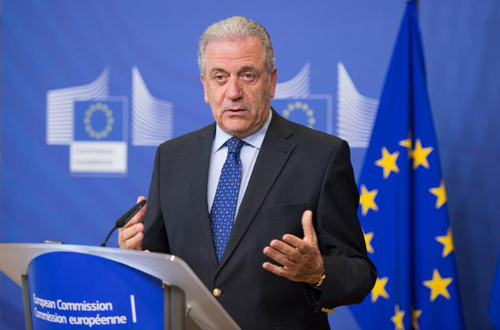EU Commissioner Speaks on Proposal to Lift Visas for Georgia

EU Commissioner for Migration and Home Affairs, Dimitris Avramopoulos , speaks about Georgia visa liberalisation during a news conference in Brussels, March 9, 2016. Photo: EU Audiovisual Service
It may take about “three or four months” before the European Parliament and the EU member states decide on the European Commission’s proposal to lift visa requirement for Georgian citizens, EU Commissioner for Migration and Home Affairs, Dimitris Avramopoulos, said.
The European Commission put forth a legislative proposal to allow visa-free travel to the Schengen area for Georgian citizens on March 9.
Before it can go into force, the proposal has to be approved by the European Parliament and the Council of European Union, a body representing the executive governments of the EU member states.
Speaking at a news conference in Brussels, Commissioner Avramopoulos expressed hope that the European Parliament and Council of the EU will adopt the proposal “soon.”
Asked when the process is expected to be finalized, Avramopoulos said: “Hopefully everything will be ready in the beginning of the summer.”
He said that “it takes approximately three or four months” for the European Parliament and the Council of the EU to decide.
“We’ve just launched the procedure and I believe that within this timeline we shall be ready,” Avramopoulos added.
He also said that announcement on putting forth the legislative proposal “is not a surprise as we already gave our positive assessment in December when we confirmed that Georgia met all the benchmarks under the visa liberalisation action plan.”
“We are able to take this step thanks to the real strong efforts made by the government of Georgia to arrive at this point,” the Commissioner said.
“Visa free travel will further facilitate people-to-people contacts and strengthen business, social and cultural ties between the European Union and Georgia – it is an important achievement for the citizens of Georgia,” he said.
European Commissioner for Neighbourhood Policy Johannes Hahn said in series of tweets:
Welcome adoption of @EU_Commission proposal to lift #visa requirements for the citizens of #Georgia. 1/3
— Johannes Hahn (@JHahnEU) March 9, 2016
Well deserved as #Georgia successfully met all benchmarks under the #Visa Liberalisation Action Plan. 2/3
— Johannes Hahn (@JHahnEU) March 9, 2016
Visa free travel will facilitate people-to-people contacts +strengthen ties betw. #EU +#Georgia.Hope f. quick adoption by #EP+@EUCouncil.3/3
— Johannes Hahn (@JHahnEU) March 9, 2016
Welcoming the announcement by the European Commission, Georgia’s Foreign Minister Mikheil Janelidze said he hopes the legislative proposal will be adopted by the European Parliament and the EU member states “very soon.”
Georgia’s PM Giorgi Kvirikashvili tweeted:
.@EU2016NL visa liberalisation is a good step for #Georgia but also the #EU: #GeorgiaVisaFree is a European success story in difficult times
— Giorgi Kvirikashvili (@KvirikashviliGi) March 9, 2016
Like in respect of Georgia, the European Commission said in December that it was going to put forth a similar legislative proposal for Ukraine in early 2016, but it appears to be delaying.
Asked about Ukraine, Commissioner Avramopoulos responded: “Ukraine is working very hard on all these issues in order to meet all the benchmarks. We [are] still working in a positive way in order to put also Ukraine in the list [of countries eligible to visa waiver in the Schengen area] within next months.”
He also said that Ukraine is committed to meet all the criteria and “it is a question of some time to fulfill all these benchmarks.”
After approval from the European Parliament and Council of the EU, Georgian citizens, holding biometric passports, will be able to enter the Schengen area without visa more than one time during 90 days in any 180-day period.
According to the Justice Ministry’s Public Service Development Agency about 776,000 Georgian citizens held biometric passports as of end-2015.
The visa-free regime will apply to travels to all EU-member states, except for the United Kingdom and Ireland.
The visa exemption will apply the following EU-members, which are part of the Schengen area: Portugal, Spain, France, Germany, Belgium, Luxembourg, Netherlands, Italy, Denmark, Sweden, Finland, Austria, Greece, Poland, Slovakia, Slovenia, Hungary, the Czech Republic, Latvia, Lithuania, Estonia and Malta.
It will also apply to those EU-member states, which are not yet part of the Schengen zone: Cyprus, Croatia, Romania and Bulgaria, as well as to following non-EU member states: Iceland, Liechtenstein, Norway and Switzerland.
This post is also available in: ქართული (Georgian) Русский (Russian)